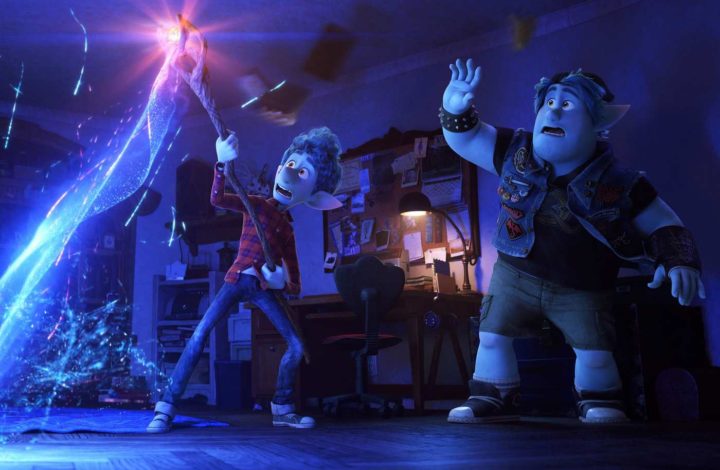
MPAA Rating: PG | Rating: ★★★
Release year: 2020
Genre: Adventure, Animated Director: Dan Scanlon
The latest Pixar film Onward opens with a narration describing a world formerly filled with magic, but which has traded the supernatural for technological comforts and ease. A world of elves, wizards, and centaurs has hung up their magic spells and fairy wings, instead opting for cell phones and traffic jams. It’s reminiscent of Max Weber’s description of the supposed “disenchantment of the world” in modernized secular Western culture, where capitalism and science reign supreme over moral values and religious beliefs. Weber’s ideas have been rightly challenged in recent years, and in its own way, Onward attempts to be part of this wider “re-enchantment” project as the first original non-sequel Pixar film since 2017’s Coco. Yet to call Onward an “original” film feels like a misnomer, as it borrows so heavily from cultural works ranging from “Dungeons and Dragons” to Lord of the Rings to the Indiana Jones films to Weekend at Bernie’s. For a film about magic, I wish Onward had more…well…magic. Wonder. Imagination. Enchantment. The world-building is fairly bland and never fully explores its mythical inspirations, while the buddy quest narrative structure is formulaic and derivative (perhaps intentionally so?). Despite its conventionality and corporate feel, Onward is nevertheless an enjoyable and affecting romp.
Onward follows the journey of shy teenage elf Ian (voiced by Tom Holland) and his boisterous blundering older bro, Barley (voiced by Chris Pratt) as they seek a magical gem which may allow them to spend one day with their deceased father, who passed away from an illness before Ian was born. You see, on Ian’s sixteenth birthday, his mom, Laurel (Julia Louis-Dreyfus), gave him a present from his dad, a magical wizard staff and a “phoenix gem.” Only when the spell misfires halfway through, Ian and Barley’s dad is only half reincarnated, leaving only a sentient pair of walking legs. If they can find a new gem before the spell breaks, they’ll have some few precious moments with their lost loved one. But to do so, they’ll have to rediscover the magic of their world, remembering their mythical origins and becoming who they were always meant to be.
The above premise promises moments of awe, hilarious comedy, wild adventure, and touching reunions. And in some ways, Onward succeeds in all of these endeavors. Yet it feels strangely hampered or muted in a way, as if the story was forced to follow familiar plot beats and action/adventure sequence tropes—the path for this hero’s journey is well-trodden. I mentioned Indiana Jones above, and I counted at least a half a dozen overt imitations of sequences or set pieces from Steven Spielberg’s quadrilogy. From a “leap of faith” invisible bridge across a bottomless pit to a tunnel of boobytraps with a giant geometric threat bearing down on our heroes (here it’s a gelatinous cube instead of a spherical boulder), the Spielbergian moments feel more like mimicry than mere allusion. There’s definitely chemistry between Holland and Pratt as Ian and Barley in their voice performances (perhaps due to their MCU collaborations?), and the film wonderfully includes Laurel’s own quest as a mother looking for her sons, which makes the final act confrontation and reunion all the more harrowing and tear-inducing. But the greatest misstep is that in a world seemingly brimming with magic waiting to come back into the public, the actual magic spells and wizardry is so slight and underwhelming. There are never moments of wondrous jaw-dropping awe like I’ve felt in the How to Train Your Dragon films or moments of WALL-E, no teeth-clenching action sequences like those of the Toy Story films, Monsters Inc., or even Up (adventure is out there!). With the power of Pixar’s animation behind it, a story about magic could be absolutely mind-blowing in spectacle and color, going well beyond any restrictions we might have in the physical “real” world. But Onward unfortunately remains strikingly suburban, never fully breaching boundaries or reaching its potential. Still, there are enough moments of humor to keep one entertained, and I have to admit that the final familial moments brought tears to my eyes in a way which felt earned and not manipulated.
Director Dan Scanlon’s previous feature Pixar film is only Monsters University, which is perhaps telling—that film is the epitome of “it’s fine.” This new film feels like an original, personal project from Scanlon which was somehow diluted by the corporate machine behind it all: Disney. Like all previous Pixar feature films, Onward opens with a short film, but with a noticeable difference from previous entries: it’s a new short from The Simpsons, titled “Playdate with Destiny” and featuring little Maggie in a short romance tale. It initially felt like a strange mismatch—Pixar and Simpsons?—but the reasons for such a move became apparent when the Gracie Films logo appeared in the credits, featuring a new silhouette in the theater seats, one with famously large round mouse ears. Indeed, following the Walt Disney Company’s purchase of all 20th Century Fox assets back in 2018, the worlds of Pixar, the Simpsons, Marvel, Star Wars, and Terrence Malick’s A Hidden Life are all part of the same corporate universe. Why bother with magic when you already control the world?
IMDB Listing: https://www.imdb.com/title/tt7146812/
Leave a Reply